

Unlocking Futures Learning Framework.pdf. WEF Schools of the Future Report 2019. Soft skills for a hard world. Robots are Not Coming Formatted. The future of work. Rethink: Caleb Femi says 'creative thinking' is key to students' future. Image copyright Shutterstock Caleb Femi, the first young people's laureate, says students must think creatively to secure a better future.
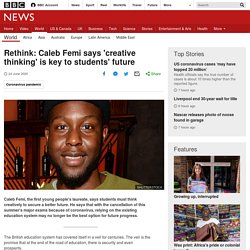
He says that with the cancellation of this summer's major exams because of coronavirus, relying on the existing education system may no longer be the best option for future progress. The British education system has covered itself in a veil for centuries. The veil is the promise that at the end of the road of education, there is security and even prosperity. Will your job be around in 2030? Nearly 40% won't, report says. From shopping online to building cars, robots continue to take over more tasks – and soon may come for your job.
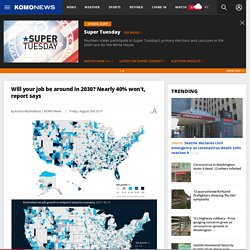
Nearly 40% of U.S. jobs are in occupations that are likely to shrink or be cut by 2030, according to a new report that measures the future of work in America. Office support – which employs almost 21 million Americans – is at risk to losing jobs to digital services. Food service is next on the list, with hotel, fast-food and other kitchens potentially automating the work of cooks and dishwashers.
“Seattle’s experience will be similar to other places, though our tech strengths present opportunities to benefit from these changes,” said Chris Mefford, president and CEO of Seattle-based economy firm Community Attributes Inc. (Source: McKinsey Global Institute analysis) WEF Future of Jobs 2018. Five Minds for the Future. Featured Guest: Howard Gardner, Harvard Graduate School of Education professor and author of Five Minds for the Future.

Download this podcast PAUL MICHELMAN: Hello. And welcome to the HRB IdeaCast from Harvard Business School Publishing. I’m Paul Michelman, online editorial director here. And I’ll be your host. This week, IdeaCast producer Steve Singer talks with Howard Gardner, author of the new Harvard Business School Press book, Five Minds for the Future. The New Success: ALL Learning. Match Fit: Shaping Asia capable leaders : Asialink. Match Fit: Shaping Asia capable leaders features ground-breaking research on the level of Asia capability among board members and senior executives from Australia's ASX 200 companies and top private organisations.
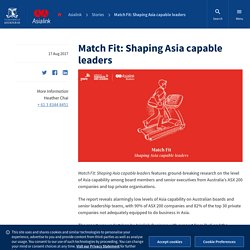
The report reveals alarmingly low levels of Asia capability on Australian boards and senior leadership teams, with 90% of ASX 200 companies and 82% of the top 30 private companies not adequately equipped to do business in Asia. The report was undertaken by Asialink Business with support from PwC and the Institute of Managers and Leaders. It features in-depth case studies of Coca-Cola Amatil and Huon Aquaculture. The full report is now available to download here Match Fit: Shaping Asia capable leaders. Media coverage. Career Change - The Profession Picker. 2019 WDR Report. Top 7 global education themes in 2019. With protests in places as disparate as Paris, Beirut, and Santiago, 2019 saw civil unrest around the world.
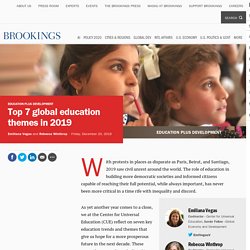
The role of education in building more democratic societies and informed citizens capable of reaching their full potential, while always important, has never been more critical in a time rife with inequality and discord. As yet another year comes to a close, we at the Center for Universal Education (CUE) reflect on seven key education trends and themes that give us hope for a more prosperous future in the next decade. These seven themes and trends, listed in no particular order, draw on research from both inside CUE and external colleagues. 1. The potential of civic education to develop citizens. 2.
Vision 2050 Refresh - World Business Council for Sustainable Development (WBCSD) In 2010, the World Business Council for Sustainable Development (WBCSD) released Vision 2050, a landmark piece of work that laid out a pathway to a world in which nine billion people are able to live well, within the limits of the planet by mid-century.
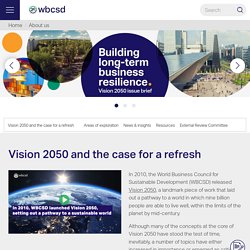
Although many of the concepts at the core of Vision 2050 have stood the test of time, inevitably, a number of topics have either increased in importance or emerged as critical new areas within the sustainable development landscape and beyond. Furthermore, the world in which business is operating continues to change: social tensions and environmental impacts are on the rise, fundamental questions are being asked about the role of business, and the economy as a whole, and the COVID-19 pandemic has brought a level global disruption unprecedented in modern times. IDC 101513. Educating students for their future, not our past. It’s so much easier to educate students for our past, than for their future.
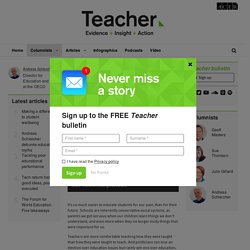
Schools are inherently conservative social systems, as parents we get nervous when our children learn things we don’t understand, and even more when they no longer study things that were important for us. Teachers are more comfortable teaching how they were taught than how they were taught to teach. And politicians can lose an election over education issues but rarely win one over education, because it takes way more than an election cycle to translate good intentions into better results.
The biggest risk to schooling today isn’t its inefficiency, but that our way of schooling is losing its purpose and relevance. And when fast gets really fast, being slower to adapt makes education systems quickly disoriented. These days, digitalisation is connecting people, cities, countries and continents in ways that vastly increase our individual and collective potential. Moving beyond content knowledge. FINAL Preparing Tomorrows Workforce. FINAL Preparing Tomorrows Workforce.